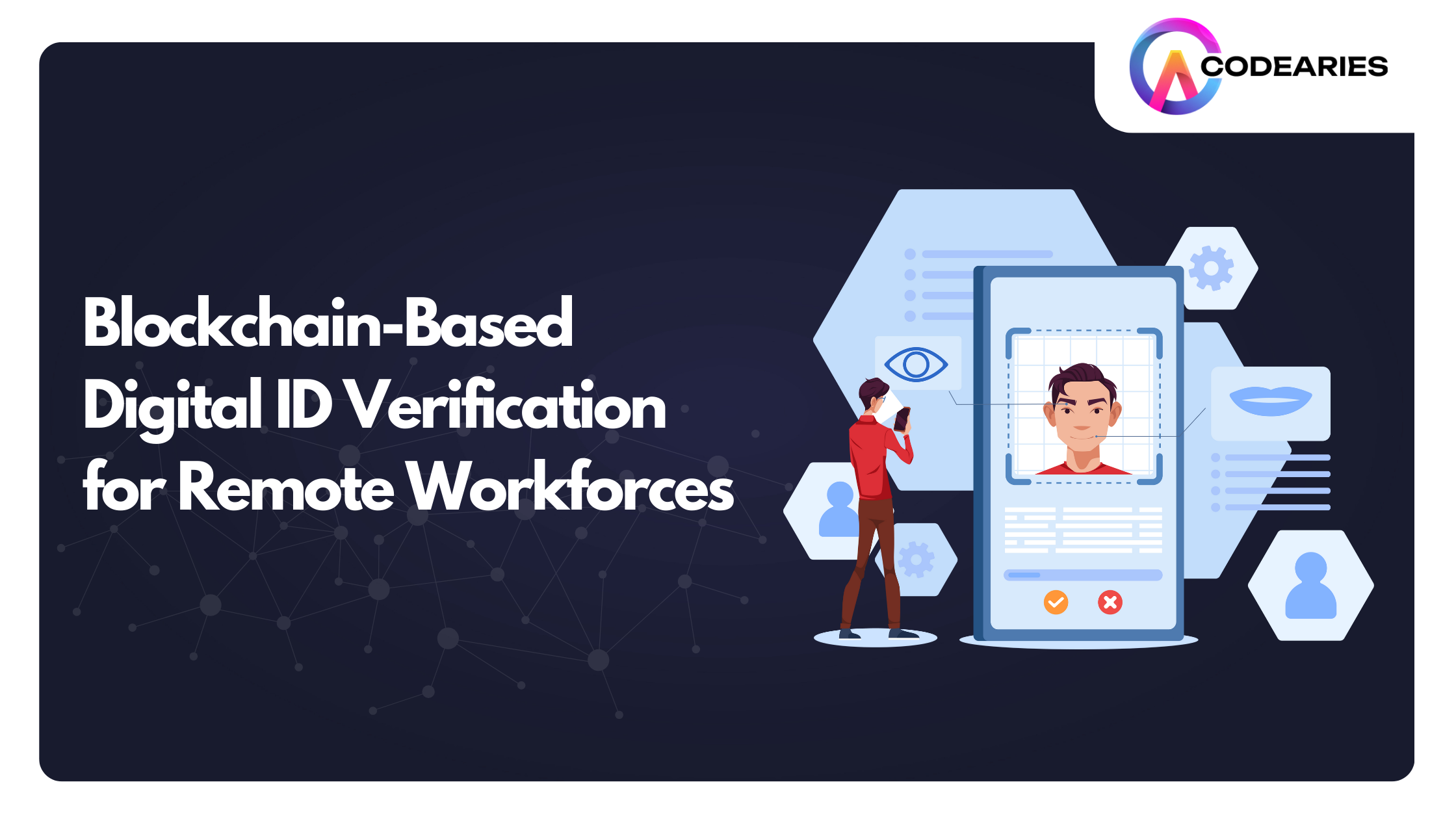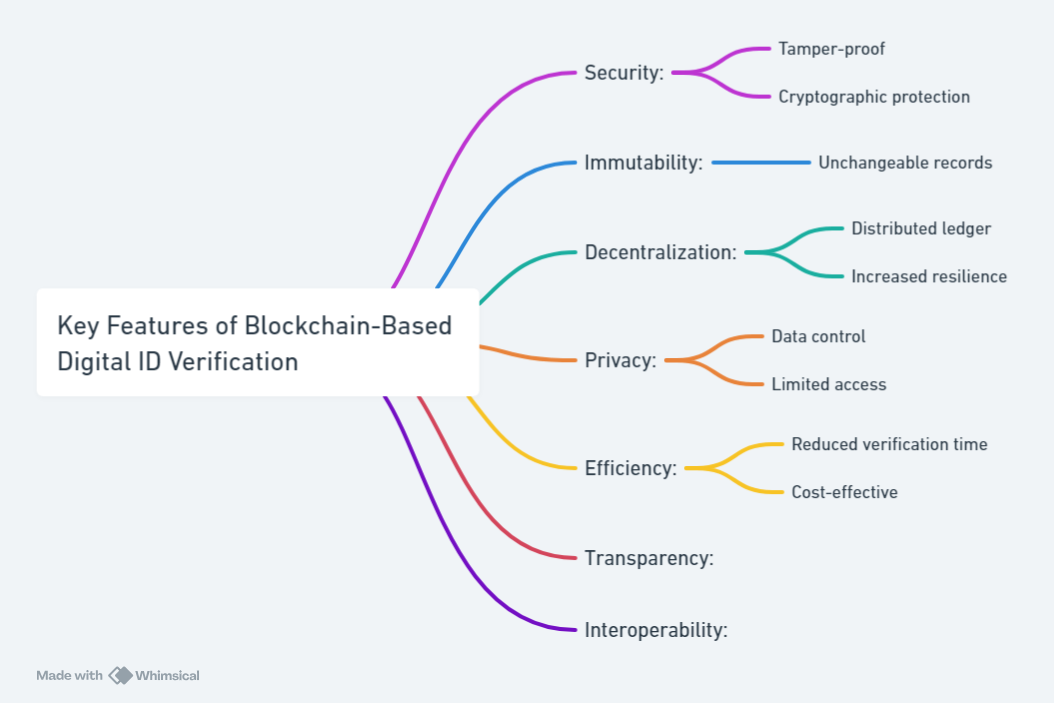
The rise of remote working models has presented businesses with unprecedented challenges, particularly when it comes to identity verification. As more employees and freelancers operate from diverse global locations, traditional methods of verifying an individual’s identity—such as in-person document checks or centralized digital systems—are becoming increasingly inefficient and vulnerable to fraud. The answer to this problem could lie in a technology originally designed to enhance the security of digital currency: blockchain.
Blockchain-Based Digital ID Verification for Remote Workforces presents a new frontier in security for remote workforces. As companies expand their networks beyond physical boundaries, there’s an increasing demand for secure, decentralized, and tamper-proof identity verification systems that can work across multiple jurisdictions. Blockchain technology, with its inherent attributes of decentralization and immutability, offers a solution to these challenges. But what exactly is blockchain, and how does it transform the world of identity verification?
This article explores the potential of blockchain in transforming digital identity verification processes for remote workforces, outlining its benefits, use cases, and challenges.
The Global Shift to Remote Work
The COVID-19 pandemic accelerated the trend toward remote work, prompting businesses to adapt quickly for operational continuity and employee safety. Key drivers include advancements in communication technology, economic pressures to reduce overhead costs, the demand for flexibility from younger workers, and the environmental benefits of reduced commuting.While remote work offers greater flexibility and access to a global talent pool, it also presents challenges related to team cohesion, productivity, and data security.
Challenges of Managing Remote Teams
Managing remote teams involves unique challenges. Communication barriers can lead to misunderstandings, while employees may feel isolated, impacting morale. Trust and accountability are harder to establish without face-to-face interactions, and time zone differences complicate scheduling. Additionally, remote environments are often more vulnerable to cybersecurity threats.Organizations can address these issues by implementing effective communication strategies, fostering trust, encouraging social interactions, and investing in robust cybersecurity measures.
The Need for Robust Identity Verification Solutions
Identity verification is essential for managing remote teams and protecting sensitive data. Reliable methods to confirm identities help prevent unauthorized access, fraud, and identity theft. They also ensure compliance with data privacy regulations like GDPR and CCPA.Improving the identity verification process enhances the employee experience by streamlining onboarding. Various methods, such as knowledge-based authentication, multi-factor authentication (MFA), and biometric solutions, can be utilized. Selecting the right solution depends on an organization’s specific needs and risk tolerance. Investing in robust identity verification helps manage remote teams effectively and safeguard sensitive information.
Blockchain-Based Digital ID Verification for Remote Workforces
Blockchain-based digital identity verification is rapidly gaining traction as a robust solution for workforce management, especially for remote and globally dispersed teams. It is a technology designed to ensure that identities are verified in a secure, decentralized manner without relying on a central authority, which makes it resistant to tampering and fraud.  Blockchain technology itself is essentially a distributed ledger that records transactions across many computers. Once data is entered into the blockchain, it is practically impossible to alter without altering all subsequent blocks, making it an incredibly secure system. In the context of identity verification, blockchain allows individuals to own, control, and verify their identities without the need for intermediaries. Blockchain Identity Management Market was valued at USD 3.38 billion in 2023 and is expected to grow at a CAGR of over 50% between 2024 and 2032.
Blockchain technology itself is essentially a distributed ledger that records transactions across many computers. Once data is entered into the blockchain, it is practically impossible to alter without altering all subsequent blocks, making it an incredibly secure system. In the context of identity verification, blockchain allows individuals to own, control, and verify their identities without the need for intermediaries. Blockchain Identity Management Market was valued at USD 3.38 billion in 2023 and is expected to grow at a CAGR of over 50% between 2024 and 2032.
Traditional ID Verification vs. Blockchain-Based ID Systems
| Aspect | Traditional ID Verification | Blockchain-Based ID Systems |
| Data Storage | Centralized databases | Decentralized distributed ledger |
| Security | Vulnerable to data breaches | Highly secure and tamper-proof |
| Efficiency | Slow and manual processes | Instant verification and data sharing |
| Scalability | Difficult to scale for large numbers of users | Easily scalable to accommodate large remote teams |
| Fraud Risk | Susceptible to forgery and counterfeiting | Reduced risk of fraud due to immutability |
| User Control | Limited control over personal data | Users have control over their own identity data |
| Privacy | Privacy concerns with physical document storage | Enhanced privacy through cryptographic techniques |
| Integration | Often requires separate systems for various functions | Easily integrates with existing systems |
| Verification Methods | Relies on physical documents and in-person checks | Uses cryptographic methods for identity verification |
| Compliance | Challenging to maintain compliance | Simplifies compliance with regulations (e.g., GDPR) |
This table summarizes the key distinctions, emphasizing the advantages of blockchain-based ID systems over traditional methods.
Key Features of Blockchain-Based Digital ID Verification
Decentralized Identifiers (DIDs)
Decentralized Identifiers (DIDs) are crucial for blockchain-based digital identity verification. They are unique identifiers not linked to any centralized authority, offering several benefits:
- Control: Individuals manage their own DIDs and data access.
- Portability: DIDs can easily transfer between platforms.
- Interoperability: Compatible with various identity verification protocols.
- Resilience: Resistant to censorship and attacks.
Verifiable Credentials
Verifiable credentials are digital certificates that confirm an individual’s identity or attributes, issued by trusted organizations and cryptographically signed for authenticity. They can validate:
- Identity: Name, date of birth, address.
- Education: Schools and degrees.
- Professional Licenses: Medical or legal credentials.
- Employment History: Past employers and job titles.
Stored on a blockchain, these credentials are tamper-proof, reducing fraud risks.
Self-Sovereign Identity (SSI)
Self-Sovereign Identity (SSI) empowers individuals to control their identity data. Key principles include:
- Individual Control: Users decide who accesses their data.
- Decentralization: Reduces breach risks by avoiding central servers.
- Interoperability: Works with various verification protocols.
- Privacy: Minimizes shared personal data.
Multi-Factor Authentication (MFA) Integration
Multi-Factor Authentication (MFA) enhances security by requiring multiple identification methods. Common MFA types include:
- Knowledge-based: Security questions.
- Possession-based: Physical tokens or mobile devices.
- Inherence-based: Biometric verification.
Integrating MFA with blockchain identity systems strengthens security against unauthorized access and fraud.
Use Cases of Blockchain ID Verification in Remote Workforces
Remote Onboarding of Employees
Remote onboarding is vital for businesses employing remote workers, and blockchain-based identity verification can enhance this process.Benefits include:
- Less Paperwork: Reduces reliance on physical documents, easing the administrative load for employers and new hires.
- Accelerated Onboarding: Facilitates quick identity verification, allowing new employees to start contributing sooner.
- Enhanced Security: Tamper-proof design lowers the risk of fraud and identity theft.
- Improved Compliance: Assists in adhering to data privacy and security regulations.
Freelancer and Gig Worker Identity Verification
As the gig economy grows, verifying freelancers and gig workers is increasingly important. Blockchain provides a secure method for this.Advantages include:
- Fraud Prevention: Confirms identities to mitigate fraud.
- Payment Accuracy: Ensures payments go to the correct individuals.
- Reputation Management: Offers a verifiable record of work history and credentials.
Access Control for Remote Teams
Effective access control is crucial for remote teams, and blockchain-based identity verification offers a reliable solution.Benefits include:
- Strong Authentication: Ensures only authorized personnel access company resources.
- Dynamic Authorization: Adjusts access rights based on role or location.
- Reduced Data Breach Risk: Minimizes chances of unauthorized access through robust security measures.
Secure Cross-Border Employment Contracts
With global operations on the rise, blockchain can facilitate the secure management of cross-border employment contracts.Advantages include:
- Fraud Reduction: Verifies identities involved in cross-border agreements.
- Enhanced Compliance: Helps organizations meet international labor and immigration laws.
- Efficient Dispute Resolution: Provides a transparent record for easier contract dispute resolution.
By utilizing blockchain technology, organizations can streamline remote workforce management, reduce fraud risks, and ensure regulatory compliance.
Conclusion: The Future of Workforce Security
As remote work continues to expand, the demand for secure, efficient, and reliable identity verification systems becomes increasingly critical. Blockchain-based digital identity verification addresses the limitations of traditional methods, offering various advantages for both employers and employees.By decentralizing the verification process, blockchain enhances security, mitigates fraud, and improves workforce management efficiency. It empowers individuals by granting them control over their digital identities while providing a universal solution that transcends geographical and regulatory boundaries.The future of workforce security lies in adopting blockchain for digital identity verification. Companies embracing this technology will be better positioned to navigate the complexities of a global, remote workforce.
FAQs
How can digital identity on blockchain contribute to a smart city environment?
Digital identity on blockchain ensures secure, tamper-proof, and decentralized management of personal data in smart cities. It allows seamless, privacy-preserving access to services like healthcare and transportation, reducing identity fraud while giving citizens control over their data.
How can blockchain technology best help secure identity data?
Blockchain secures identity data through decentralization, encryption, and immutability. It eliminates central points of failure, uses cryptography to protect data, and ensures that once data is recorded, it can’t be altered, preserving both privacy and integrity.
Is blockchain the future of digital identity management?
Blockchain has strong potential for digital identity management by enabling self-sovereign identities. It enhances security, privacy, and user control, reducing reliance on centralized systems, which are more vulnerable to breaches and privacy risks.
How can you verify digital identity using blockchain?
Blockchain verifies digital identity through cryptographic public-private key pairs. Users sign verification requests with their private key, and verifiers check the signature against their public key. Zero-knowledge proofs can further verify identity attributes without exposing data.


